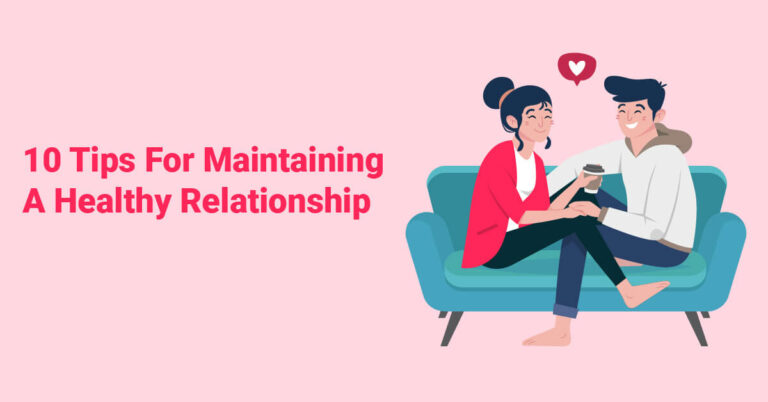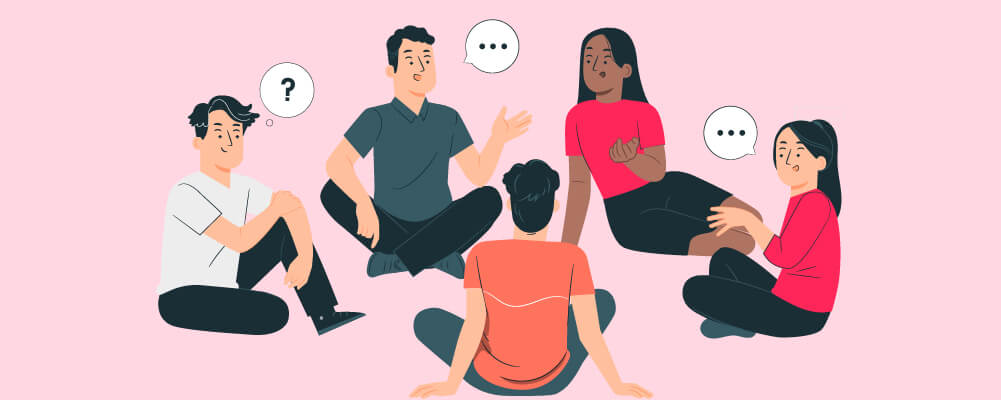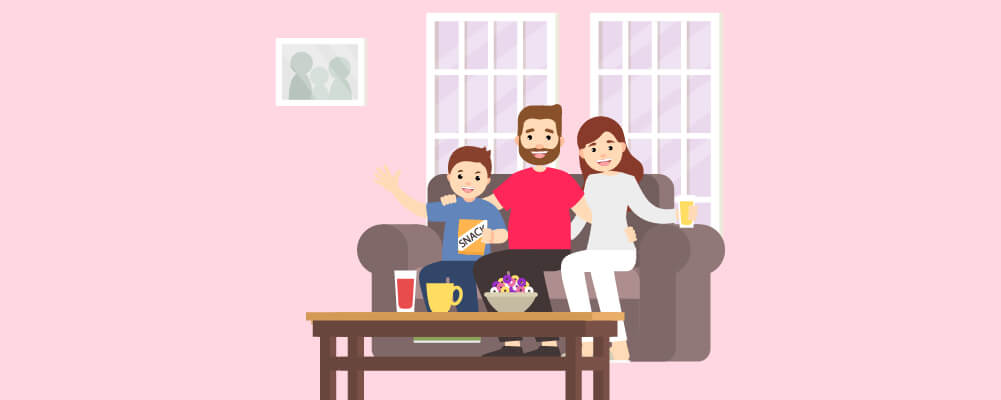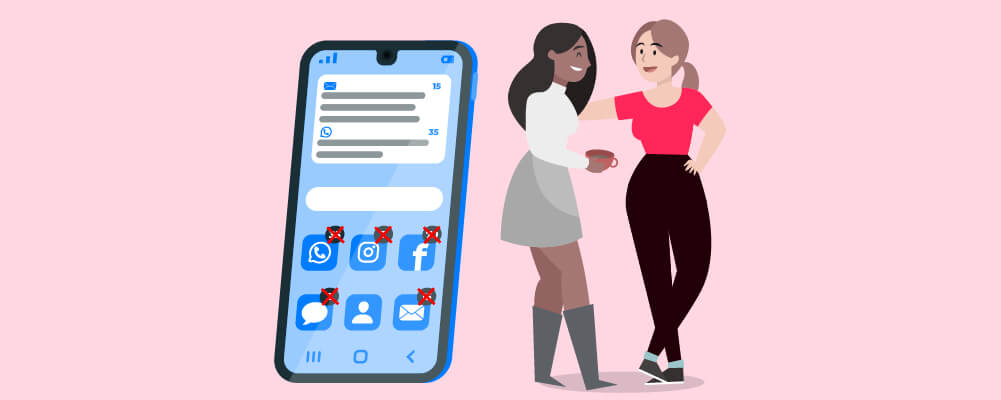How to Have & Maintain A Healthy Relationship

Humans are social creatures. We simply can’t thrive on our own – we need each other to create, build, grow, and evolve.
Of course, the human race no longer needs to simply “survive,” as apart from the odd environmental catastrophe, we have mastered the ability to live a relatively safe life. Most of us can easily build shelter, collect clean water, and eat food from our farms.
However, we still have the “need to belong” despite our physical health no longer depending on it. Instead, it’s our mental health that’s at risk. This means that we need healthy, sustainable relationships in order to thrive.
When we talk about relationships, we don’t necessarily mean romantic relationships. They can include your family, friends, co-workers, classmates, or neighbors. You will develop some kind of relationship with everyone you meet, even if it’s only short-term.
This desire to be part of a community is so strong and instinctive, that it can encourage us to stay in a relationship that isn’t healthy. In this article, we explain how to maintain a healthy relationship, and why healthy relationships are important.
[toc]
Table of contents [ Show Hide ]
- What Makes A Relationship Healthy
- 10 Tips On How To Maintain A Healthy Relationship
- The Benefits Of A Healthy Relationship
- Red Flags To Be Aware Of
- Summary
What Makes A Relationship Healthy

Every relationship is unique, and there isn’t one way to feel content or happy. That being said, there are common patterns in a healthy relationship and they often come down to respect, understanding, and kindness.
Meaningful Connection
When you spend time with someone, whether it’s a friend, family member, or romantic partner, you should feel emotionally fulfilled by their presence. This meaningful connection is the difference between being loved and feeling loved.
The meaningful connection can be hard to define, but if you feel as though this person respects you, and gets you in a way that makes you feel seen, then you have made that connection.
Open And Respectful Communication
It is normal to disagree with someone as long as you do so respectfully. Respect means that you do not intend to humiliate the other person, nor dismiss their concerns.
When you talk through your disagreements, the idea is to find common ground and understanding. If you and your friend or partner have big discussions or arguments that lead to successful communication, then your relationship can still be a healthy one.
The fact that you feel safe enough to express volatile emotions without fear of retaliation means that you trust this other person to understand you.
However, if you are afraid to speak up and find yourself allowing the other person to “win”, then there is an unhealthy balance in this relationship.
Interests Outside The Two Of You
Although there may have been a time where you wanted to spend every minute together, in reality one person cannot meet all of your needs. It’s unhealthy to expect your partner to be your lover, your best friend, your confidant, your gym buddy, and have all the same interests as you.
Having friends outside of your relationship can help you enjoy your hobbies and other interests while developing your identity away from your partner.
Keeping your own identity strong will allow you to still feel whole even when you’re without your partner, which is a crucial aspect of a healthy relationship.
10 Tips On How To Maintain A Healthy Relationship

To some of us, maintaining relationships comes easy. But others may need a hand navigating some of the challenges. We have 10 tips on how to maintain a healthy relationship.
Talk to the person you want to connect with, too. Share this article with them. If you are both on the same page, your relationship will grow stronger.
1. Respect
“Respect” is one of the building blocks needed to create and maintain a healthy relationship.
In a healthy relationship you should find these characteristics of respect:
- Privacy and Space – Respecting your partner’s privacy and alone time shows that you trust them and respect their needs.
- Physical Boundaries – If your partner doesn’t want to be intimate, or tells you that they are uncomfortable with doing something physical, understanding this and agreeing to avoid it is a level of respect all healthy romantic relationships should have. It shows you understand their boundaries.
- Compromising – Understanding your partner’s feelings and wishes often means finding common ground. Compromising on an issue allows you both to feel comfortable, and therefore respected.
- Disagreeing respectfully – respectful communication, even during arguments, is important in every relationship. It shows that you are able to listen actively to the other person’s concerns, and that you don’t make them feel bad for expressing themselves.
Respect should be one of the basic pillars in your relationship. It doesn’t matter what the dynamic is; whether you are thinking about your partner, parent, sibling, friend, or co-worker, respect is needed from both people involved.
For instance, it is common for parents to demand respect from their children but refuse to give any back. When they fall into this trap, the child feels unheard and uncared for. They will likely begin to lie, disconnect, or even belittle their parents in retaliation.
When it comes to romantic relationships, rom coms imply that the butterfly feelings in your stomach are all that matters. But in reality, it’s the knowledge that someone has your back and respects your needs that allows the relationship to flourish.
2. Actively Listen
Listening is one of the most important skills in a relationship. This means more than just hearing what someone says and waiting your turn to talk; you have to understand and empathize too.
To be an active listener, you need to pay attention to the details of the conversation, give the person your full attention, ignore any bias or judgments you might have, and then respond when appropriate.
For example, when your partner is talking, make a mental note of their feelings and the main points they are talking about. Don’t interrupt them, allow them to talk and express themselves.
The restraint involved in not interrupting is often the most challenging part, but it’s important to wait until the speaker asks for your input. When you do respond, try paraphrasing what they have told you, to show you have been listening.
Paraphrasing is when you repeat the concept but not the words. This shows that you understand the issue from a different perspective and you are concentrating on a specific area of the issue. Then when you give your advice or comments, they are likely to be better received.
3. Consistency
When we talk about consistency in a relationship, that doesn’t mean spontaneity is off the table or that your personality cannot ever change. Consistency means treating the other person in the same respectful, trusting, and loving way over time.
For instance, if you like to spend quality time after dinner with your partner, they would expect to spend quality time with them regularly. Of course there are days where you might need some space, but generally they know to expect you to act a certain way.
However, if you change your behaviour sporadically and randomly decide to not spend time with them without a reason, it might throw them off and make them feel unsettled.
4. Support Groups

A support group is made up of friends outside of a given relationship. A healthy lifestyle should include at least two support groups.
By having multiple people to talk to, you can get different perspectives of any issues you are experiencing in your relationships. One group could be made up of family members and the other of close friends.
It might seem like hard work to maintain the friendships that make up your support group, but this doesn’t need to be an intensive task.
The key is being proactive about staying in touch. Catching up with your friends over coffee once a month could be all you need to maintain valuable friendships that offer support.
Remember that you don’t have to take advice from people in a support group, and they don’t have to take yours either. Simply listening to another perspective could be enough to help solve problems with other relationships.
5. Trust
Building up trust is crucial if you want to maintain a healthy relationship. Trust is more than just believing that someone will do the “right thing”; it’s a sign of depth and understanding in a relationship.
There are different levels of trust that cut across different types of relationships. Basic trust involves physical safety and respect for each others’ belongings. This is essential to develop a deeper level of trust, where you trust the other person emotionally.
Trusting a romantic partner or friend emotionally means that you know they care about your emotional wellbeing.
This is on top of the expectation of commitment in exclusive romantic relationships. Maintaining emotional trust in a relationship requires consistent effort from both people.
If your partner has lost your trust, you need to consider giving them opportunities to regain it. Discuss and reflect on the problems you have faced, why you feel hurt, and what needs to happen to restore trust.
All of this is important to move on and to start rebuilding again. To maintain a healthy relationship, you must work on trust on a daily basis.
6. Set Boundaries And Be Ok With Saying “No”
Setting up boundaries and letting your partner know how you feel is essential to maintain a healthy relationship.
People often think that saying “yes” to others’ needs and wants means you’re being a good friend or a good partner. However, constantly doing things you aren’t comfortable with is emotionally draining and creates resentment.
To keep your relationships happy and healthy, you need to tell the people in your life when you are uncomfortable with something. For example, if you like cooking for your partner but don’t expect to do it every day, you should feel comfortable saying so.
Saying “no” doesn’t have to mean saying “never”; all you are doing is letting your partner or friend know where you stand on the issue. And in order for the relationship to be a healthy one, the other person should respect your boundaries.
7. New Experiences
Doing new things together is an easy way to make a relationship fun and rewarding. Sharing a new experience with someone is a great way of enriching a relationship.
Whether it’s going to a new restaurant, going for walks, jumping out of a plane, or taking up a new hobby, doing this with a partner or friends means you can explore common feelings together. New experiences also lead to making lasting memories which also create deeper bonds.
8. Healthy Social Media Use
There are many articles online that suggest social media will ruin our ability to communicate, but in reality that isn’t true.
Social media is an amazing tool to connect to friends and family that live far away. It helps develop communities around niche topics that would otherwise be isolated.
When it comes to your relationships, it can help you develop stronger bonds as you share information and instant thoughts that would otherwise be lost.
However there are a few downsides to social media that should be mentioned. If you don’t have a strong level of trust with your partner, then you may develop jealousy when you see them connecting with others, particularly when it’s on social media.
Another downside is the comparison we tend to do when looking at other couples’ highlight reels on their social media. It’s easy to fall into the trap of comparing and thinking that others have a better relationship than you.
Even looking at your partner’s exes can cause you to develop negative comparisons.
If you find yourself going down this negative path, it’s a sign to take a break from social media. Remember that your relationship is in the real world.
9. Realistic Relationship Goals
We use the world around us to understand how to act and what to expect. When it comes to romantic relationships, we often use TV and movies to figure out how we should behave.
However these are forms of entertainment. To be entertaining they need to have conflict, which means a lot of these behaviors we witness are intentionally unhealthy.
Instead of following these dramatized relationships, you should instead focus on your own.
Have an honest conversation with your partner and ask them what they expect from the relationship. The same goes for you, be sure to share your views too, so they have the chance to understand what you want and need.
When the both of you are communicating openly, you will be better able to help each other through the obstacles that might be in your way. This goes for many types of goals, from financial to having children.
For your relationship goals to be achievable, both people need to be invested in their success.
10. Be Kind
Overall, the most important advice for maintaining a healthy relationship is to be kind. Kindness and empathy are the best way to understand those around you.
Knowing how they might feel in a situation, and wanting them to be happy are the driving forces behind a healthy relationship.
Respecting someone’s wishes is an important aspect of being kind. When you actively listen to your friend or partner, you are also practicing kindness by allowing them to express themselves with you.
Honesty is another form of kindness. While it might be easier to tell your partner or friend what they are hoping to hear, telling them the truth from a place of empathy is necessary to maintain a healthy relationship.
The Benefits Of A Healthy Relationship

When you are in a healthy relationship, you can expect a myriad of wonderful experiences.
Navigating Stress
When you are in a happy and healthy relationship, you are more able to deal with stress.
The connection you have with people allows you to feel safe and secure in your environment, and this feeling translates physically. You start producing less cortisol (a stress hormone) due to this feeling of safety.
Of course, life will throw you lemons, but a good support system will help you battle through these problems. If your relationship is healthy, you should feel stronger when dealing with life stresses.
Health
When you are happy, supported, and content, your body is allowed time to focus on itself.
Shockingly, research shows that people in long-term romantic relationships are 3 times more likely to survive heart surgery than those who are single. This is because their bodies know they can relax when they are around their loved ones.
If the patient were by themselves, without a community to support them, they would have to worry about more than just their health. Bills, food, and house maintenance are just a few things that will be running through an unsupported person’s mind.
With another person there to help and support you, your body can relax.
The same goes for just being around your significant other. The happiness you feel while spending time with someone you love is strong enough to affect your hormones. In turn this changes elements of your body. For example, boosting your immune system or lowering your blood pressure.
Happiness
Of course, the main sign that you are in a healthy relationship comes from the amount of happiness you feel.
A healthy relationship is mostly happy with a sprinkling of negative emotions. When those rain clouds come, you should be able to talk through the problem and come to an understanding.
There is a sense of comfort and calm that comes from knowing you can talk openly with this person. You can completely be yourself, and that is the ultimate happiness.
Red Flags To Be Aware Of

No matter what your relationship looks like, you should feel fulfilled, happy, and understood. Feelings of anxiousness and distress when you are around this person could signify that you’re struggling.
Just as there is no one way to be in a healthy relationship, there isn’t a single issue that can declare your friendship or romantic relationship as bad. To help you navigate through this time, read through our “red flags.” We will explain what they mean, how to identify them, and suggestions to mend your relationship.
Knowing these issues can not only recover a falling connection, but it can also help maintain a healthy relationship that’s hit a rocky patch.
Love Bombing
Love bombing is a relatively new issue that modern relationships struggle with. It usually happens in new romantic relationships, but sometimes these signs come through after a fight too.
Love bombing is when someone becomes extremely invested in your relationship. They shower you with affection, attention, declarations of love, and anything else to get you hooked on them. This intensity draws you in and gives you a warped view of how your relationship will be.
When the love bomber dials down their enthusiasm, you are left heartbroken as a massive gap in affection appears between the two of you. This can happen in platonic, romantic, and familial relationships alike.
As you ask your person why things have changed, the love bomber becomes defensive, claiming you are “clingy.” The cycle continues as the bombed falls victim to emotionally abusive behavior from a narcissistic personality.
If you notice these behaviors cropping up, talk to your partner or friend about boundaries. Perhaps you should mention that you don’t need so many gifts to feel affection, or maybe you want to take the relationship slowly.
Setting up this slow pace allows you to see the person as they are without being dosed with endorphins. And it also allows the love bomber to understand how you want to be loved.
Constant Comparisons To Social Media

Being on social media isn’t an instant red flag. Communicating online can create an incredible connection to people you may never have met otherwise. However, there is a limit.
Seeing what other people are doing all the time can give you a false image of the world around you. If someone is constantly posting pictures of them at the gym, that doesn’t mean that they are working out every day, and it doesn’t mean that they find workouts easy.
Most importantly, your lives probably don’t follow a similar pattern to these images either. Your free time and finances are unlikely to match a social influencer whose job is to work out. Because of this, you shouldn’t compare yourself to the posed images posted online.
However, if you notice that your partner constantly compares themselves to these online figures, this could be a red flag. People with low self-esteem tend to fall into this category. They might obsess over every little detail due to their own insecurities.
You can expect the negativity to spill into other aspects of their lives, causing problems between you and them. For example, they might ask you to change clothes, lose weight or hide your personality, to look better online.
If you notice this downward spiral occurring, suggest taking a break from social media and instead practice self-love. This can mean focusing on the great parts of yours and their life, giving slack for the challenges faced and simply allowing the two of you to live without judgment.
You Don’t Seem To Understand Each Other
A lack of communication is the easiest way to fall out of a relationship. Misunderstandings can confuse and even hurt feelings. Although it doesn’t mean that your friend, partner, or family member is a bad person, I can suggest that the connection you once had is starting to fade.
Normally, miscommunications occur when one person expects the other to show love the same way. However, people rarely experience love in the same way.
One person might show love by giving gifts; however, the other may think this is “a way to “buy them”. Another might show love by offering vocal affirmation, but the other may think it’s “fake and cheesy.”
You shouldn’t expect your partner to know how you want to be loved. Instead, you should figure out what you enjoy in a relationship and explain that to your friend, romantic partner, or family member. Then you should ask the other person what they need too.
Extreme Emotional Reactions
If someone cannot control their emotions, this is a massive red flag. If the smallest issue can send them into a violent rage, you know to keep away from that person, as you might get hurt. However, there is more than one way to lose control.
If someone gives you the “silent treatment” instead of talking to you about their emotions, then they are experiencing the same inability to control themselves. Instead of flying off the handle, they can shut everything down as a punishment to you. This is a type of emotional abuse.
In both scenarios, the person lacks empathy. They are either unaware of your feelings, or they purposely intend to hurt them. Being empathetic means more than knowing how someone is feeling; it’s about caring for those emotions too.
An empathetic person will still get upset about things in their life, but they will know that lashing out will harm the people around them. Because of this, they take a moment to sit with their emotions instead.
They learn to understand what they are feeling and find a healthy way to resolve the issue. They know that screaming and shouting only creates more problems and will hurt the people they care about.
However, just because someone struggles to control their emotions doesn’t mean you shouldn’t be around them anymore. If they are willing to change, they can learn to adjust their perspective and understand how to take a step back when emotions run high.
Empathy is a learned skill, and you cannot expect everyone to have the same upbringing or environment to understand how to use it. The first step to being empathetic is understanding other people.
This could mean reading books or watching TV shows aimed at a different culture (LGBTQ+ books, books aimed at different ethnicities, religious groups, etc). Traveling is another method to understand the world in another manner.
And lastly, actively listening (as we said before) is the best way to truly take in another person’s viewpoint.
Gaslighting
Gaslighting is when someone attempts to convince another person or group of people that they have done something (or haven’t done something) when the opposite is true. The term first appeared after the 1938 play Gas Light was shown (it was turned into a movie in 1944).
In this play, a man marries a wealthy woman for her riches. Her family kept the jewels hidden, which angered him. To get his hands on the money, the husband made a mechanical contraption that would force the gas lights to flicker.
His wife would complain about the flickering lights, but he would say she was imagining things. Eventually, he convinced her she was insane. She was sent to an asylum, and he got his hands on her jewels.
In reality, a gaslighter will make you feel as though you forget things; they discredit your feelings and trivialize your emotions by downplaying the situation. They will often call you “overdramatic.”
If you notice your partner, friend, or family member is gaslighting you, you should confront them. You may need to show them evidence of the situation to prove your reliability. And if you want to mend the relationship, you should ask them why they felt the need to lie.
Just as someone isn’t born empathetic, a gaslighter is often unable to explain their feelings. They may have grown up in an environment where their needs were considered invalid, so they developed this method to get what was needed.
Creating space for open communication and allowing them to take their time to feel safe can help you get past this issue. However, you should not risk your own mental health. If things become too upsetting, you should recenter yourself and remain confident in your version of events.
Summary

When it comes down to it, maintaining a healthy relationship requires respect, trust, and communication. It doesn’t matter if this relationship is romantic, platonic, or familial; they all require these core values to succeed.
Maintaining a healthy relationship is not always easy, whether it’s a friendship or a marriage. There is no quick fix and there will be setbacks but the key thing is to put in the effort to make things work.
If you find yourself putting up a wall after an argument, take a step back and remember to engage in active listening. It can be hard to pull that wall down, but taking the time to listen instead of reacting could give you the insight to better understand the other person.
Always remember to be kind and respect yourself and the other person in the relationship. When things start to look rough, that basic level of respect will help you bounce back once the storm has passed.
These tips are your toolkit to maintain a healthy relationship, remember them, and practise them often.